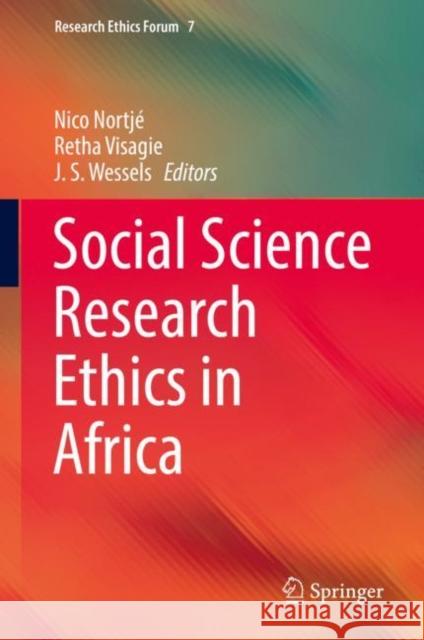Social Science Research Ethics in Africa » książka



Social Science Research Ethics in Africa
ISBN-13: 9783030154011 / Angielski / Twarda / 2019 / 253 str.
Social Science Research Ethics in Africa
ISBN-13: 9783030154011 / Angielski / Twarda / 2019 / 253 str.
(netto: 460,04 VAT: 5%)
Najniższa cena z 30 dni: 462,63
ok. 16-18 dni roboczych.
Darmowa dostawa!
1. Research Ethics and Integrity in Social Sciences in Africa
Dr Nico Nortjé has been involved with ethics training and research for the past two decades. Nico has a doctorate in Applied Ethics from the University of Stellenbosch (South Africa) and also holds two masters degrees one in Psychology (cum laude) and one in Future Studies (Business) from the same university. He furthermore also has a post-graduate diploma in Clinical Counselling from the University of Glasgow (Scotland) and another post-graduate diploma from the University of Pretoria (South Africa) in Medical Law. Nico has more than thirty peer reviewed articles and seven book chapters to his name. He is the main editor on another book looking at healthcare Ethics in Africa, and has given numerous keynote addresses across the globe. Nico is an editor for the Canadian Journal of Bioethics and is often approached by industry specific journals to write articles/opinion pieces on ethics. Nico’s own research interest includes moral decision-making in healthcare settings. He is currently on the faculty of the University of Texas MD Anderson Cancer center in Houston (USA) where he is a clinical ethicist, assistant professor in teaching, and also a member of the Institutional Review Board (IRB).
Dr Retha Visagie is the Manager: Research Integrity at the University of South Africa. She has been an advocate for research ethics reform since 2012. Prior to her appointment as a research manager, she taught psychiatric nursing science and research methodology at a number of local universities. She has a doctorate degree in Psychiatric Nursing Science from the University of Johannesburg. She furthermore also has a postgraduate diploma in Health Research Ethics (Cum Laude) from the University of Stellenbosch (South Africa). She was awarded the prestigious title of Fogarty Fellow in 2015. Retha is the 2018 recipient of the Southern African Research and Innovation Management Association’s award for professional excellence in research management. She is active in the Southern African research ethics community and, as such, is the chairperson of the Executive Board of the Research Ethics Committee Association of Southern Africa (REASA). Her research interest includes building research capacity in universities with a special interest in research ethics governance. She remains active as a research supervisor. She has co-authored nine peer-reviewed journal articles, is the author of a research-based book and presented numerous academic papers at national and international conferences. Dr JS (Kobus) Wessels (DPhil, University of Pretoria) is a National Research Foundation (NRF) C2-rated researcher in Research Methodology in Public Administration. He is a Research Professor in the Department of Public Administration and Management of the University of South Africa. As part of an on-going search for understanding the meaningfulness of Public Administration knowledge, his research focuses on the trustworthiness (quality, quantity, ethics and integrity) of that knowledge and its methods, as well as its antecedents and consequences of meaningful knowledge. Therefore, Dr Wessels specialises in Public Administration research methodology, research ethics and postgraduate research supervision. His research interests include the methodological preparation of Masters and Doctoral students, the selection of appropriate research methods for research projects, higher education policy and ethics in Public Administration. He is co-editor of and contributor to the scholarly books: Reflective Public Administration: Context, Knowledge and Methods, Reflective Public Administration: Ethics (2014), Reflective Public Administration: Views from the South (1999), and editor and contributor to the textbook South African Human Resource Management for the Public Sector (2005 and 2011). Dr Wessels has also authored and co-authored more than 40 publications in peer-reviewed journals, as well as 19 other publications, reports and scholastic contributions.This book gives a voice to debates surrounding social science research ethics in Africa and brings them together in a coherent form to assist readers in being at the forefront of the discussions. The book gives an overview of the importance of research ethics in social sciences, as well as articulating the African influence on the subject matter. Subsequently it looks into specific frameworks and tools that researchers can apply in the process of doing research. Last but not least it also takes an in-depth look at traditional ethical issues pertaining to research in social sciences, through the lens of the African continent. This is the first book on social science research ethics in an African context and an indispensable resource for researchers, students, policy makers and research institutions in or interested in African research ethics.
1997-2026 DolnySlask.com Agencja Internetowa
KrainaKsiazek.PL - Księgarnia Internetowa









